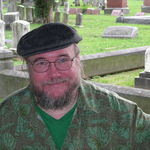
(Photo by Rory Bowman from Wikipedia)
You see a shadow
In the wrestler’s mouth
Instead of teeth –
could be he’s wearing
a protective mouthpiece.
He won’t admit
He has a phobia of dentists;
It doesn’t pay
A guy like him
To be afraid
Of anything.
Long ago, he garnered
An Olympic medal,
Before he settled
For these shiny belts
That cover his pot belly;
Each exchange of belts
Is mapped out
Like a dance.
A hard career:
A lot of injuries,
Both accidental
And arranged.
They call the bleedings
“red for green” –
he earns a bonus
when his flesh is torn.
Everyone says
Drugs are forbidden
By the rules,
But his shots pump him
Through the pain.
The agony he shows the audience
Is all pretend;
In private life
He wouldn’t even wince,
And he’d despise
Someone who whined.
At least the name he uses
Is his own, though
Whether it’s a good or bad name
All depends
On when the match is
In which tour.
His tights remain
Red, white and blue
In any case,
An homage
To his old Olympic triumph,
Always claused
In every contract.
The only pains he has a problem bearing
Are the ones that follow him
From town to town,
Not caused
By any injury.
He has no room
For real relationships –
His loyalties
Are written in,
Then out.
He sees it all
As one huge effort –
Getting through
The time until
Retirement,
When he, at last,
Can start to live.
-- © 2009 by Jack Veasey
All rights reserved. This work may not be reproduced or duplicated in any way without the author's permission.












